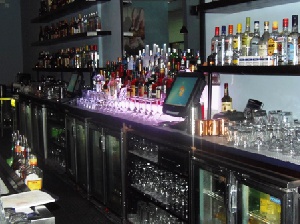Ghana's traditional liquor akpeteshie tastes like fire to the uninitiated, burning all the way down the throat to a nervous stomach. But at The Republic, a bar in the nation's capital, it comes garnished with mint and brown sugar for young professionals just getting off work.
It's part of a new drink movement in Ghana that some hope will spread across West Africa — bringing old-school drinks out of the countryside and into capital nightclubs. While many of the liquors remain popular in the bush and among the poor, putting them under the flashing lights and bass-thumping rhythms of popular bars is still a shock to many coming across them for the first time.
"We are able to make our own form of caipirinhas, our own form of white Russians, our own form of martinis," said Raja Owusu-Ansah, co-owner of The Republic. "There's a host of cocktails we have here that utilize cane spirit base — i.e. akpeteshie — and it's a success."
Akpeteshie (ak-PEH-teh-she) is a traditional liquor in Ghana, a West African nation known more for its cocoa and goldfields than its drinking culture.
Akpeteshie can be made from distilling either palm wine or sugar cane, creating an almost moonshine concoction that looks clear but carries a heavy punch. The liquor's name in the local Ga language roughly means "hide," a throwback to when colonial British authorities banned it from being made, forcing Ghanaians to take shots of it on the sly. Today, mourners pour the liquor into plastic bottles for the nation's rowdy funerals, while others drink it at roadside bars, downing it in shot glasses.
"In Ghana, everybody drinks it," Evans Narh Tekper, a palm wine tapper in the rural Ghanaian town of Koforidua, said in the local Akan language. "The akpeteshie goes round."
But now, Ghana's middle and upper classes are beginning to enjoy the drinks in cocktails familiar to anyone who has stumbled into a bar anywhere in the world. Forget rum in your mojito — instead add akpeteshie. The same goes for other favorites.
At The Republic, revelers relaxed after working a full day at white-collar jobs around Accra. It offered a very different vision of those who typically enjoy the drink, as well as a foil against the vision of the Western view of an Africa where "everyone is starving and unhappy," said Dr. Nicole Cooper, a pediatrician who grew up in Ghana and now practices in Miami, Florida.
"It definitely has put a new, contemporary spin on a very old, traditional drink," she said.
West Africa has other traditional liquors, including the many different kinds of "ogogoro" seen in nearby Nigeria. Bar-goers said they hoped this would start a new trend throughout the region of using their own liquors, a point of pride. Even Owusu-Ansah went as far as to say: "It's alcohol that's not giving you hangovers."
The jury, however, is still out on that. __
General News of Thursday, 20 June 2013
Source: Lekan Oyekanmi
"Akpeteshie" finds new life
Entertainment
















